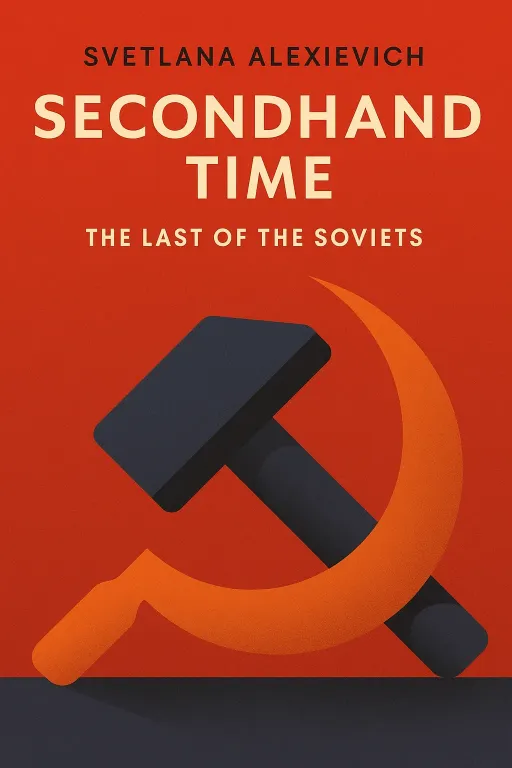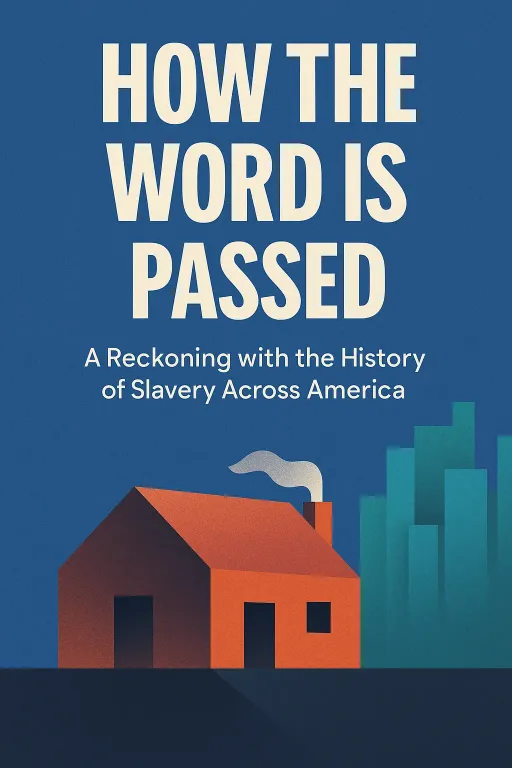
Secondhand Time
9 minThe Last of the Soviets
Introduction
Narrator: Imagine an entire civilization, a vast empire built on a single, all-consuming idea, suddenly vanishing. It doesn't just crumble politically; its language, its values, its symbols, and its vision of the future all dissolve into memory. What happens to the people left behind? What becomes of the human beings who were specifically engineered to live inside that idea, who knew no other way of life? They become exiles in their own country, speaking a language of the past that the present no longer understands. This is the world documented in Svetlana Alexievich's Nobel Prize-winning work, Secondhand Time: The Last of the Soviets. Through a polyphony of voices—of party apparatchiks and dissidents, of mothers and soldiers, of victims and executioners—the book creates an oral history not of events, but of the soul of a lost people.
The Making and Unmaking of Homo Sovieticus
Key Insight 1
Narrator: At the heart of Alexievich's work is the concept of a unique type of person forged by the communist experiment: Homo Sovieticus, or the Soviet man. This was not an accident but the explicit goal of the regime—to create a new human being detached from bourgeois concepts like private property and individualism. This person was raised for collectivism and, above all, for war. As one voice in the book states, "At heart, we’re built for war. We were always either fighting or preparing to fight. We’ve never known anything else—hence our wartime psychology."
This conditioning started in childhood. One man recounts a youth spent in military towns, where his father, a political commander, would force him and his brother to read heroic war stories and drill them on assembling a Kalashnikov. The goal was to instill an unconditional love for the Motherland and a readiness for self-sacrifice. This created a person who found meaning not in personal happiness, but in being part of a great, shared idea. The tragedy explored in Secondhand Time is what happens when that idea dies. Homo Sovieticus was left stranded, possessing a unique worldview and a shared experience that became incomprehensible to the new world of capitalism. As one of Alexievich's subjects poignantly puts it, "Only a Soviet can understand another Soviet."
The Shock of Freedom and the Betrayal of Capitalism
Key Insight 2
Narrator: The fall of the Soviet Union was not universally experienced as liberation. While the intelligentsia in the cities celebrated the arrival of freedom, for many, the transition was a traumatic shock. The initial euphoria of Perestroika quickly soured as the 1990s descended into economic chaos, rampant inequality, and a brutal new reality. People who had been taught to despise money and commerce were suddenly thrust into a world where survival depended on it.
Alexievich captures this profound disillusionment through countless stories. One engineer, who once took immense pride in building missiles for a superpower, describes his despair when his factory was converted to manufacture washing machines, only for him to be laid off shortly after. For him, the grand purpose of his life had been replaced by the banal pursuit of consumer goods. This sentiment is echoed by a woman who laments, "Freedom turned out to mean the rehabilitation of bourgeois existence... The freedom of Her Highness Consumption." Many felt they had been lied to. They believed they were fixing socialism, not replacing it with a system that felt cruel and predatory. They had traded the security of a flawed but familiar world for a supermarket of foreign goods and a society where, as many felt, the "little man" no longer mattered.
A Land Haunted by Victims and Executioners
Key Insight 3
Narrator: The Soviet experience was built on a foundation of immense violence and trauma, from the gulags to the purges. Alexievich masterfully shows how this legacy created a society where the lines between victim and executioner were hopelessly blurred. The same person could be both. This paradox is powerfully illustrated in the story of Elena, a devout communist whose father was a prisoner of war during the Russo-Finnish War. After being captured, he was treated humanely by the Finns. But upon his return to the Soviet Union, he was branded a traitor and sentenced to six years in a labor camp by his own country. Despite this profound betrayal, he remained a loyal party member until his death.
This complex relationship with the past makes repentance and justice nearly impossible. The suffering was so widespread that it became a shared, almost normal, condition of life. Alexievich quotes the writer David Rousset, who observed that in the camps, "Victim and executioner are equally ignoble; the lesson of the camps is brotherhood in abjection." This shared abjection helps explain the resurgence of Soviet nostalgia. When the present is chaotic and humiliating, the past—even a brutal one—can seem like a time of stability, greatness, and purpose. It’s why, as the book notes, a survey found that half of young Russians considered Stalin an "unrivaled political figure," a chilling testament to a history that has never been fully reckoned with.
The Human Cost of a Collapsing Empire
Key Insight 4
Narrator: While history books record the fall of the Berlin Wall and the dissolution of the USSR, Secondhand Time focuses on the forgotten human cost of these grand events. The collapse of the empire unleashed a wave of ethnic conflicts in places like Abkhazia, Tajikistan, and Chechnya, turning neighbors into enemies overnight. Alexievich gives voice to the refugees and survivors of these brutal wars. One woman recounts her idyllic childhood in the multi-ethnic region of Abkhazia, where Georgians and Abkhazians lived side by side. When war erupted, her world was shattered. She witnessed horrific violence, became a refugee living in a Moscow train station, and was left so traumatized that she lost her faith in humanity.
The indifference of the new Russian state to this suffering is another recurring theme. In one of the book's most heart-wrenching accounts, a mother, Ludmila, tells the story of her daughter, Olesya, who joined the police force to make a living and was sent to Chechnya. Olesya died there under suspicious circumstances, officially a suicide. Ludmila’s quest for truth is met with a wall of bureaucratic indifference and corruption. She is told her daughter isn't a hero because she didn't kill anyone. This story reveals a society where life has been devalued, where justice is for sale, and where the state that once demanded ultimate sacrifice now offers nothing in return.
Conclusion
Narrator: The single most important takeaway from Secondhand Time is that the end of the Soviet Union was not merely a political or economic event; it was an anthropological catastrophe. It marked the end of a civilization and the ideology that animated it, leaving millions of people psychologically unmoored, grappling with a secondhand version of time, pieced together from the wreckage of a grand, failed utopia.
Svetlana Alexievich’s work forces us to look beyond the simplistic narratives of Cold War victory and failure. It challenges us to consider the "history of the soul" and asks a deeply unsettling question: What happens to human beings when the grand story that gave their lives meaning, and even justified their suffering, disappears overnight? They are left to wander through the ruins, searching for new words and new ideas, haunted by the ghosts of who they once were.









